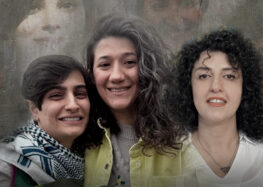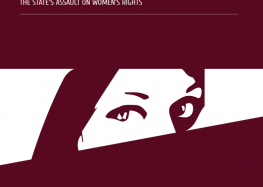The Rouhani Administration
While there were expectations that the status of women would improve after Rouhani’s victory, this has not proved to be the case. During his presidential campaign, Rouhani’s remarks in support of women’s rights were unequivocal: “Men and women are equal in the eyes of Islam and the Islamic Revolution,” Rouhani said in a speech during his campaign at the Great Islamic Encyclopedia Center on May 1, 2013. “The next government will be the government of equal opportunity for men and women.” He added, “Ignoring women’s demands is in conflict with the logic of the Islamic Revolution.”
And in remarks with great future relevance to the subsequent acid attacks on women, Rouhani said in a speech on June 9, 2013, in the Grand Mosque in Sari, “In [my] government…no one will (be allowed to) violate women’s rights in the name of Islam, because I will not be hiding behind the veil of religion and piety.”
Yet by and large the pledges Rouhani made during his campaign regarding women’s rights have not been fulfilled, and discriminatory gender-based policies have continued to advance, if not accelerate. It remains an open question whether this is due to lack of will or ability, but explicit legislation calling for public enforcement of “virtue” represents a new level of assault against women in Iran. This unusual exchange of remarks by Rouhani and Khamenei reflects the growing intensity of the debate. On May 13, 2014, Khamenei stated,
“Sometimes when there is talk of offering guidance and religious fact, some people say we are not responsible for sending people to heaven. Actually we are. This is the distinction between an Islamic theocracy and other types of governments. The Islamic ruler wants to act in a way that would deliver people to heaven; to the true and eternal happiness. We must pave the path (to paradise). We are not talking about forcing things and compelling people, but helping them. People intuitively seek salvation. We must clear the path and make getting to heaven easier for them. This is our duty.”
Soon after these remarks by Khamenei, Rouhani asserted on May 24,
“We shouldn’t intervene in people’s lives so much, even if it’s out of compassion. Let’s allow people to find the path to paradise themselves. We cannot force people to heaven through force and lashing. Prophet [Mohammad] did not have a whip in hand. The Prophet made promises and gave warnings, and we must do the same. We must all work together to bring peace to society.”
The conservative response to these remarks was immediate and unequivocal: Ahmad Khatami, a cleric and Friday prayer leader in Tehran stated on May 30, “Paving the path to paradise is (our) calling. That is why the government has a duty to pave the way to heaven for people.” On the same day, Ahmad Alamolhoda, the Friday Prayer leader in Mashhad, said, “Lashing is nothing! We’ll use all that we have to stop those who prevent people’s entry to heaven.” And the Head of the Iranian Judiciary, Sadegh Larijani, stated on June 12,“[Saying] we shouldn’t force people into heaven comes from a modern-liberal way of thinking…Westerners believe governments should be neutral and should not play a role in determining [societal] values. Such a statement comes from this way of thinking.”




